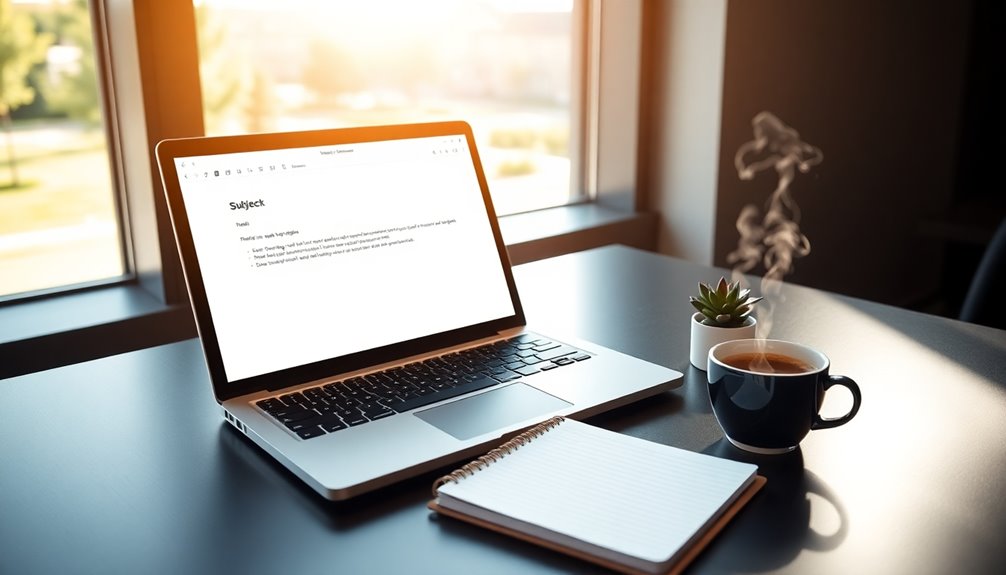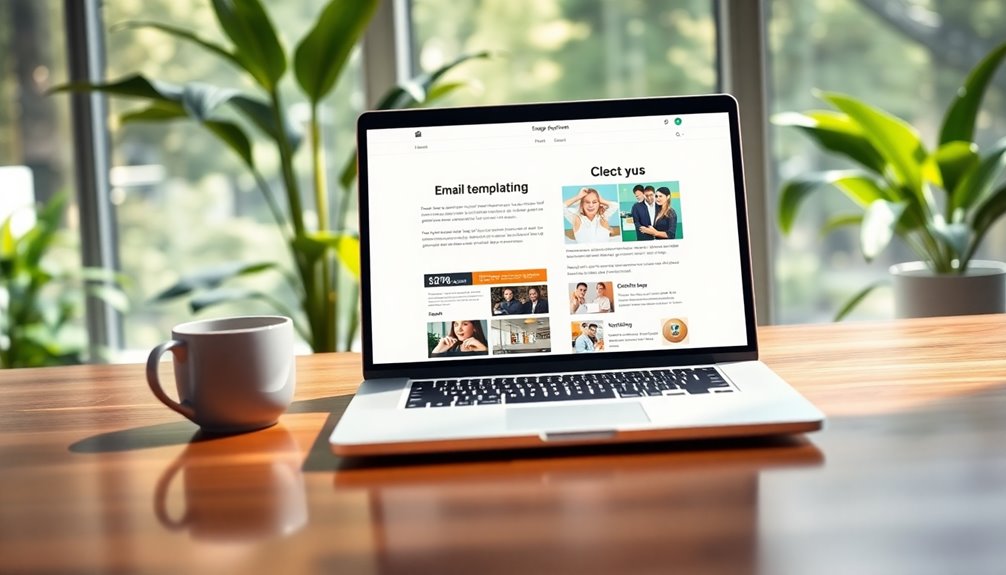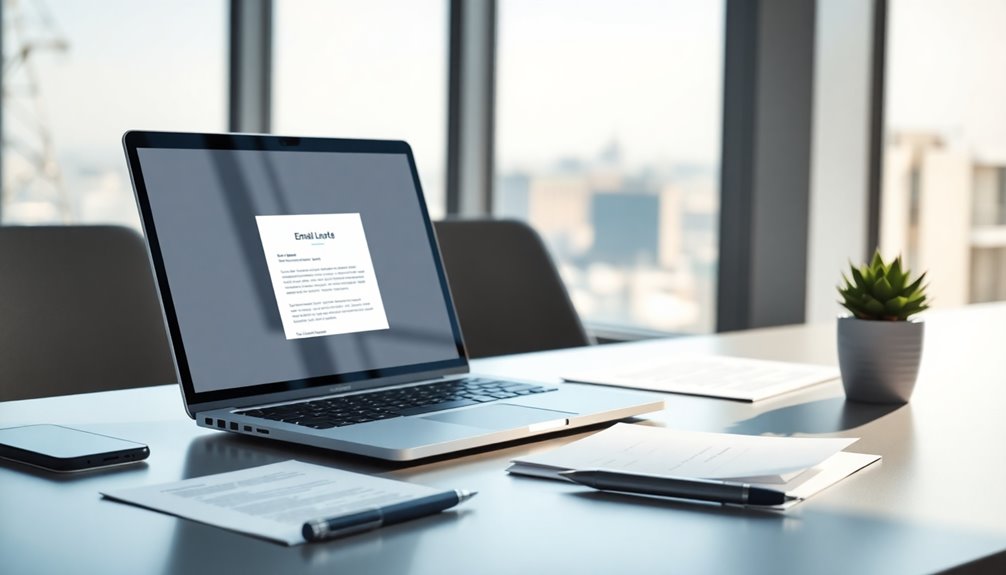To write a professional email to a professor and get a quick reply, start with a clear, specific subject line that reflects your email's purpose. Use a formal greeting and briefly introduce yourself, stating your major and the course you're referencing. Clearly outline the reason for your email in the first few sentences, avoiding jargon. Keep your email concise with short paragraphs or bullet points for better readability. Show respect for their time with a polite closing and your contact information. If you follow these steps, you'll boost your chances of receiving a swift response and discover even more strategies.
Key Takeaways
- Use a clear and specific subject line to convey the email's purpose and capture the professor's attention.
- Start with a formal salutation and briefly introduce yourself with relevant details.
- Clearly state your request or question early in the email for immediate understanding.
- Keep the email concise, using short paragraphs and bullet points for ease of reading.
- Respect the professor's time by sending the email during working hours and allowing time for a response.
Introduction

Writing a professional email to a professor is crucial for effective communication in an academic setting. When you reach out, it reflects your seriousness and professionalism. To ensure your email stands out, start with a clear and concise subject line that indicates the email's purpose. This small detail can significantly enhance the likelihood of a quick response, especially since professors often juggle numerous emails daily.
Proper email etiquette is also essential. Use formal greetings like "Dear Professor [Last Name]" and end with a respectful closing. This demonstrates respect and helps establish a positive rapport, making professors more inclined to reply promptly.
When composing your email, include relevant context. Mention the course details and specific questions you have. This helps professors quickly grasp your intent and respond more efficiently.
Lastly, timing matters. Sending your email during regular working hours, avoiding late evenings and weekends, increases the chances of a prompt reply, as professors are more likely to check their emails then.
Builds Professional Relationships

Building professional relationships with professors can significantly impact your academic journey. When you send an email that's respectful and well-crafted, it shows you value their time and expertise. This kind of engagement not only builds professional relationships but also enhances your academic success. Faculty mentorship is linked to better student performance, and professors often appreciate students who take the initiative to communicate professionally.
By establishing connections with your professors, you gain valuable insights into their research areas. This can lead to collaborative projects or academic guidance, opening doors to research opportunities and internships. Regular communication helps foster a sense of belonging, making you feel more integrated into the academic community.
Maintaining an ongoing dialogue is crucial. When you send an email, remember that it's not just about the immediate question or concern; it's about building a lasting relationship. Professors who see your commitment and professionalism are more likely to invest time in mentoring you, which can benefit your future endeavors.
Clear and Specific Subject Line
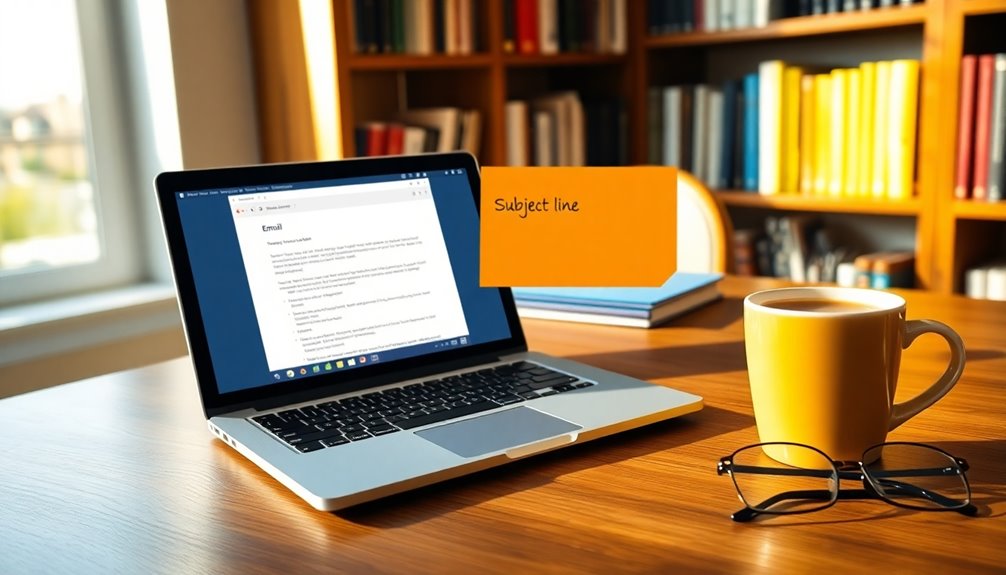
Starting your email with a clear and specific subject line is key to effective communication with your professor. A well-crafted subject line should directly indicate your email's purpose, like "Request for Assignment Extension" or "Inquiry About Research Opportunities." This helps grab the professor's attention quickly and ensures they know what to expect.
Avoid vague subject lines; they can lead to your email being overlooked. Instead, use precise keywords relevant to your content for easy identification. Keeping the subject line brief yet informative allows the professor to understand your intent at a glance, minimizing the time spent deciphering its purpose.
While you might feel tempted to indicate urgency, use such terms sparingly. Overusing "Urgent" can dilute its importance and could even lead to a delayed reply back.
Crafting Your Email Structure

A well-structured email can significantly enhance your communication with a professor. Start with a formal salutation, like "Dear Professor [Last Name]," to set a professional tone.
Next, briefly introduce yourself by stating your name, year, major, and the specific course you're referencing. This helps the professor recall who you are and provides context.
Clearly state the purpose of your email early on. If you want to ask a question, make sure it's direct and concise. For example, "I'd like to ask a question regarding the recent assignment" gets right to the point.
Using short paragraphs and straightforward language improves readability, making it easier for the professor to grasp your message quickly.
Conclude with a polite closing remark, such as "Thank you for your time." This shows appreciation and respect for their busy schedule.
Finally, include your full name and relevant contact information at the end. This keeps everything clear and professional, ensuring your email is easy to respond to.
Dos and Don'ts for Emailing Professors
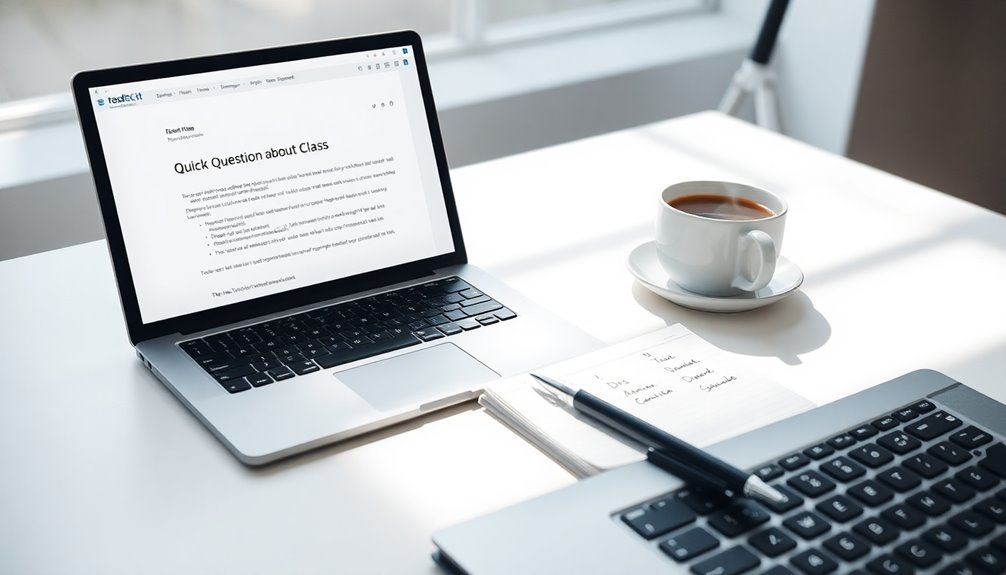
When reaching out to a professor via email, it's essential to follow certain dos and don'ts to ensure effective communication.
First, do check your course materials and FAQs before reaching out. Many questions are often already answered, which helps reduce unnecessary inquiries.
Next, don't use vague subject lines; instead, be concise and informative to clearly indicate your email's purpose. This makes it more likely you'll get a quick response.
Additionally, do maintain professionalism throughout your email. Use proper greetings and closings to show respect for the professor's time and expertise.
On the other hand, don't expect an immediate reply; allow 2-3 days for a response since professors juggle multiple responsibilities.
Examples of Student Inquiries
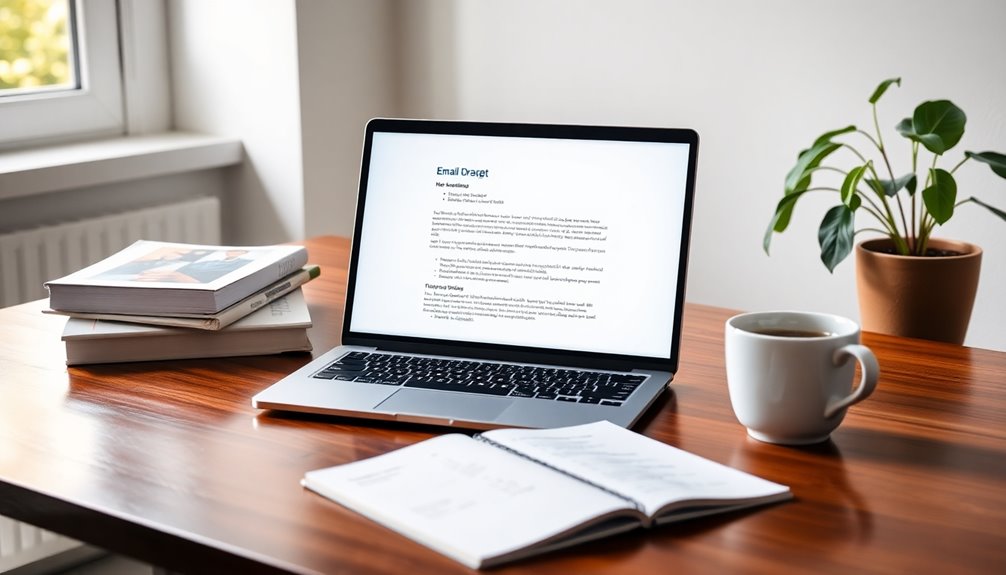
Crafting clear and specific inquiries can significantly enhance your communication with professors. When you send an email to your professor about assignment deadlines, make sure to include the course name and the specific assignment. This helps them quickly address your question.
If you're asking about office hours or meeting appointments, suggest a few specific times you're available to make it easier for them to reply promptly.
For clarity on course materials, reference the specific lecture or reading and include quotes or page numbers. This way, the professor can respond more efficiently.
When you're interested in research opportunities, express your enthusiasm for their work and highlight relevant skills or experiences. This approach makes your inquiry stand out.
If you need to follow up on a previous message, politely reference that email and reiterate your inquiry succinctly. This shows respect for their time while emphasizing your continued interest.
Keeping track of these details in your emails can help foster a more productive dialogue with your professors, ultimately leading to quicker and more informative replies.
Pro Tips for Writing Effective Emails
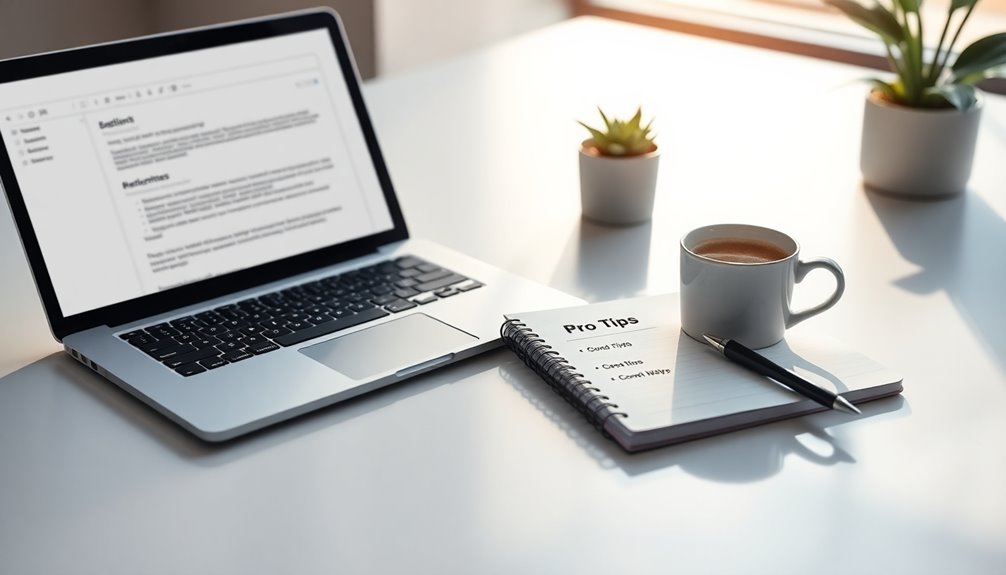
Effective email communication is essential for building a positive relationship with your professors. When you write an email, start with a clear and concise subject line that indicates your email's purpose, like "Request for Extension." This helps your professor quickly recognize and prioritize your message.
Begin with a polite greeting, addressing your professor by their title and last name. This establishes a formal tone right from the start.
Next, introduce yourself briefly by stating your full name, academic status, and the course you're enrolled in. This context makes it easier for your professor to remember you.
In the body of your email, state your request or question clearly and succinctly. Being direct enhances readability and encourages quicker responses.
Don't forget to conclude with a respectful sign-off, like "Best regards," followed by an automatic signature that includes your full name, student ID, and relevant course details. This clarity helps your professor identify you easily.
Final Thoughts
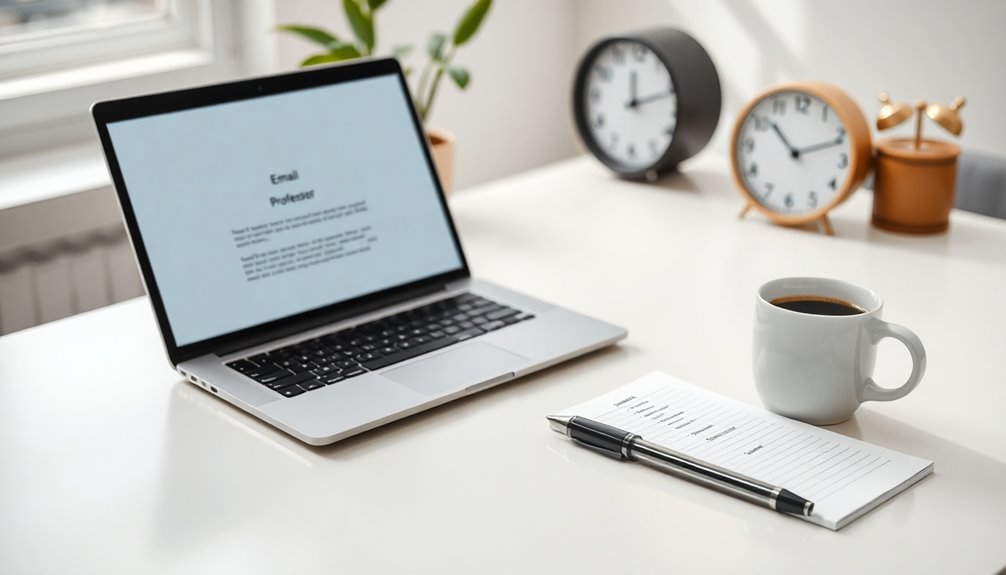
Keeping these tips in mind will set you up for successful communication with your professors. Crafting a concise email that clearly states your purpose within the first few lines is crucial, especially since professors get an average of 100 emails daily. A well-thought-out subject line helps them prioritize their inbox, making it easier for them to respond promptly.
Always introduce yourself briefly and include relevant course details, which gives context to your inquiry. Respect their time by sending emails during standard working hours; late-night or weekend messages may get overlooked.
If you don't receive a reply within a week, don't hesitate to send a follow-up email. Professors often juggle multiple responsibilities, and your gentle reminder can be just what they need.
Frequently Asked Questions
How Do You Write a Quick Email to a Professor?
When you write a quick email to a professor, start with a clear subject line that highlights your purpose.
Address them respectfully, using their title, and introduce yourself briefly.
Get straight to the point by stating your question or request early in the email.
Keep it concise, avoiding unnecessary details.
How to Write a Professional Thank You Email for Quick Response?
To write a professional thank you email for a quick response, start with a polite greeting, addressing your professor properly.
Express your genuine gratitude for their prompt reply, acknowledging their effort.
Clearly restate the purpose of your original inquiry to remind them of the context.
Keep your tone concise and professional, avoiding casual language.
How Do You Write a Get Well Soon Email to a Professor?
When you write a get well soon email to your professor, start with a respectful greeting like "Dear Professor Smith."
Express your concern for their health, keeping your message compassionate yet brief.
Offer your support by mentioning your willingness to help with class tasks during their recovery.
Close with a polite sign-off, reiterating your best wishes.
This approach shows empathy and respect, ensuring your message is both thoughtful and professional.
How to Politely Ask a Professor to Reply to an Email?
If you're looking to politely ask a professor to reply to your email, wait a couple of days before sending a follow-up.
Start by referencing your previous message to remind them of your inquiry. Keep your tone respectful and understanding, acknowledging their busy schedule.
A concise email with a clear subject line like "Follow-Up on [Original Subject]" will help them quickly identify your request and hopefully prompt a response.
Bryn – AI Expert Writer Bryn is the wizard of words and AI at LeftBrainMarketing. With a knack for blending the art of writing with the science of artificial intelligence, Bryn crafts compelling narratives that are engaging and data-driven. Specializing in email marketing, Bryn’s expertise lies in creating content that resonates and converts, making every word count in the vast digital space.
